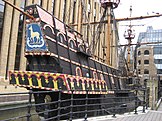Wikipedia:Selected anniversaries/September 26
This is a list of selected September 26 anniversaries that appear in the "On this day" section of the Main Page. To suggest a new item, in most cases, you can be bold and edit this page. Please read the selected anniversaries guidelines before making your edit. However, if your addition might be controversial or on a day that is or will soon be on the Main Page, please post your suggestion on the talk page instead.
Please note that the events listed on the Main Page are chosen based more on relative article quality and to maintain a mix of topics, not based solely on how important or significant their subjects are. Only four to five events are posted at a time and thus not everything that is "most important and significant" can be listed. In addition, an event is generally not posted this year if it is also the subject of the scheduled featured article, featured list or picture of the day.
To report an error when this appears on the Main Page, see Main Page errors. Please remember that this list defers to the supporting articles, so it is best to achieve consensus and make any necessary changes there first.
Images
Use only ONE image at a time
-
Francis Drake
-
The Statue of Sir Francis Drake in Plymouth, England
-
title=Ruins of the Parthenon (painting by Pierre Peytier)
-
Yves Rossy
-
William II of England
Ineligible
| Blurb | Reason |
|---|---|
| European Day of Languages | refimprove |
| 1810 – The Riksdag of the Estates adopted a new Act of Succession to regulate the right of members of the House of Bernadotte to accede to the Swedish throne. | refimprove |
| date not sourced, and other sources say the 23rd | |
| 1907 – Newfoundland and New Zealand became dominions within the British Empire. | Newfoundland has unreferenced section |
| 1914 – The Federal Trade Commission, an independent agency of the United States government to promote consumer protection, was established. | unreferenced section |
| 1918 – World War I: The Meuse–Argonne offensive, the bloodiest single battle in American history, began. | refimprove section |
| 1933 – As gangster Machine Gun Kelly surrendered to the FBI, he supposedly shouted out, "Don't shoot, G-Men ['government men']!", which became a nickname for FBI agents. | refimprove section, date not cited |
| 1934 – The ocean liner RMS Queen Mary, now a museum ship in Long Beach, California, was launched in Clydebank, Scotland. | unreferenced section |
| 1957 – West Side Story, a musical written by Arthur Laurents, Leonard Bernstein and Stephen Sondheim and based loosely on Shakespeare's Romeo and Juliet, made its debut on Broadway. | expansion, refimprove section, one section has many CN tags |
| 1960 – More than 70 million people watched U.S. Senator John F. Kennedy and Vice President Richard Nixon in the first-ever televised U.S. presidential election debate. | needs more footnotes |
| 2002 – MV Le Joola, a Senegalese government-owned ferry, capsized off the coast of The Gambia, resulting in the deaths of at least 1,863 people. | refimprove |
| 2009 – Typhoon Ketsana struck the Philippines, the most devastating typhoon ever to hit Manila, before moving on to affect Southeast Asia. | unreferenced section |
Eligible
- 1087 – William II, son of William the Conqueror, was crowned king of England.
- 1493 – Pope Alexander VI issued the papal bull Dudum siquidem, the last of the Bulls of Donation, marking the beginning of the Spanish colonization of the Americas.
- 1907 – The British Colony of New Zealand officially became a dominion to reflect its political independence since the 1850s.
- 1917 – World War I: The Battle of Polygon Wood, part of the Battle of Passchendaele, began near Ypres, Belgium.
- 1942 – The Holocaust: Nazi official August Frank issued a memorandum setting out how the belongings of murdered Jews were to be disposed of.
- 1959 – Japan was struck by Typhoon Vera, the strongest and deadliest typhoon on record to make landfall on the country, causing damage in excess of US$261 million and over 5,000 deaths.
- 1968 – The Beatles completed the recording of John Lennon's song "Happiness Is a Warm Gun", regarded by all the band members as their favourite on the album The Beatles.
- 1983 – Soviet Lieutenant Colonel Stanislav Petrov averted a possible worldwide nuclear war by identifying what otherwise appeared to be an impending attack by the United States as a false alarm.
- 1983 – The racing yacht Australia II, captained by John Bertrand, won the America's Cup and ended the New York Yacht Club's 132-year defence of the trophy.
- 2008 – Swiss pilot and inventor Yves Rossy flew a wingpack powered by jet engines across the English Channel.
- 2014 – Forty-three students of the Ayotzinapa Rural Teachers' College in Iguala, Mexico, were kidnapped and probably later killed.
- Born/died: Fujiwara no Teika |d|1241| Francis Daniel Pastorius |b|1651| Richard Grenville-Temple |b|1711| Théodore Géricault |b|1791| Mary Russell, Duchess of Bedford |b|1865| Lynn Anderson |b|1947| Wendy Saddington |b|1949| Leslie Morshead |d|1959| Ramang |d|1987
- 1580 – Explorer Francis Drake's galleon Golden Hind (replica pictured) sailed into Plymouth, England, completing his circumnavigation of the globe.
- 1687 – The Parthenon in Athens was partly destroyed in an explosion while being used as a gunpowder magazine by Ottoman forces during an armed conflict against the Venetians.
- 1944 – World War II: The Soviet Army completed the Tallinn Offensive, driving German forces out of Estonia.
- 2010 – Scottish aid worker Linda Norgrove and three Afghan colleagues were kidnapped by members of the Taliban in Kunar Province, Afghanistan.
- Daniel Boone (d. 1820)
- Bertha De Vriese (b. 1877)
- Vladimir Voinovich (b. 1932)






